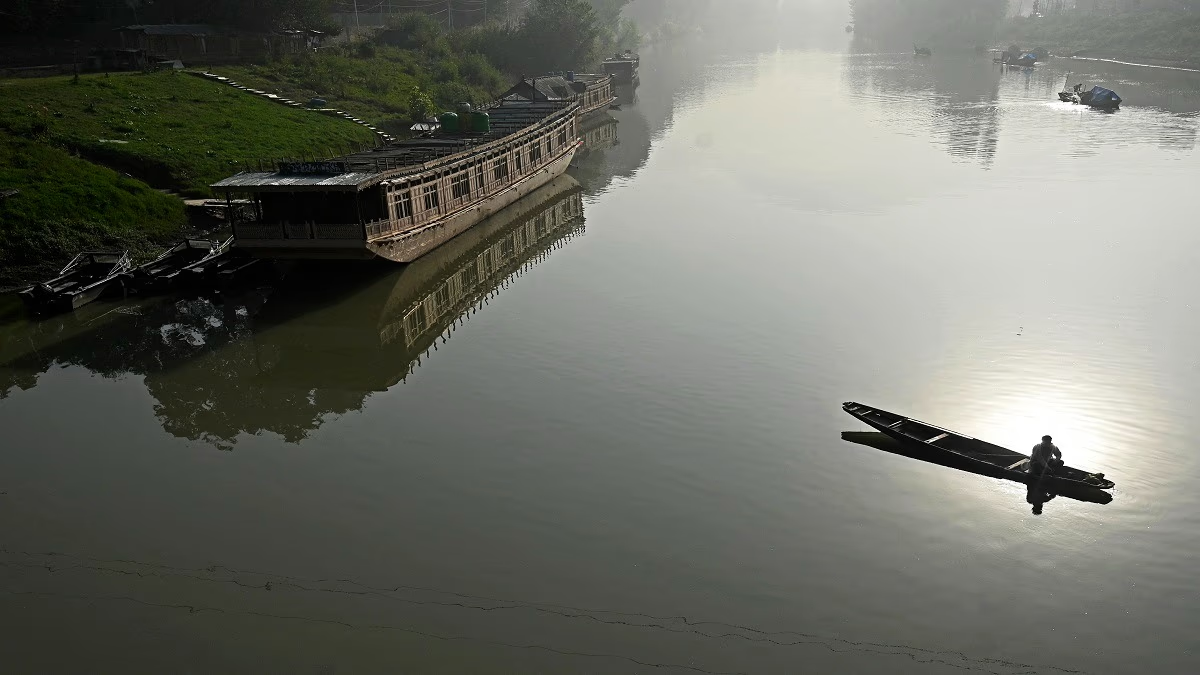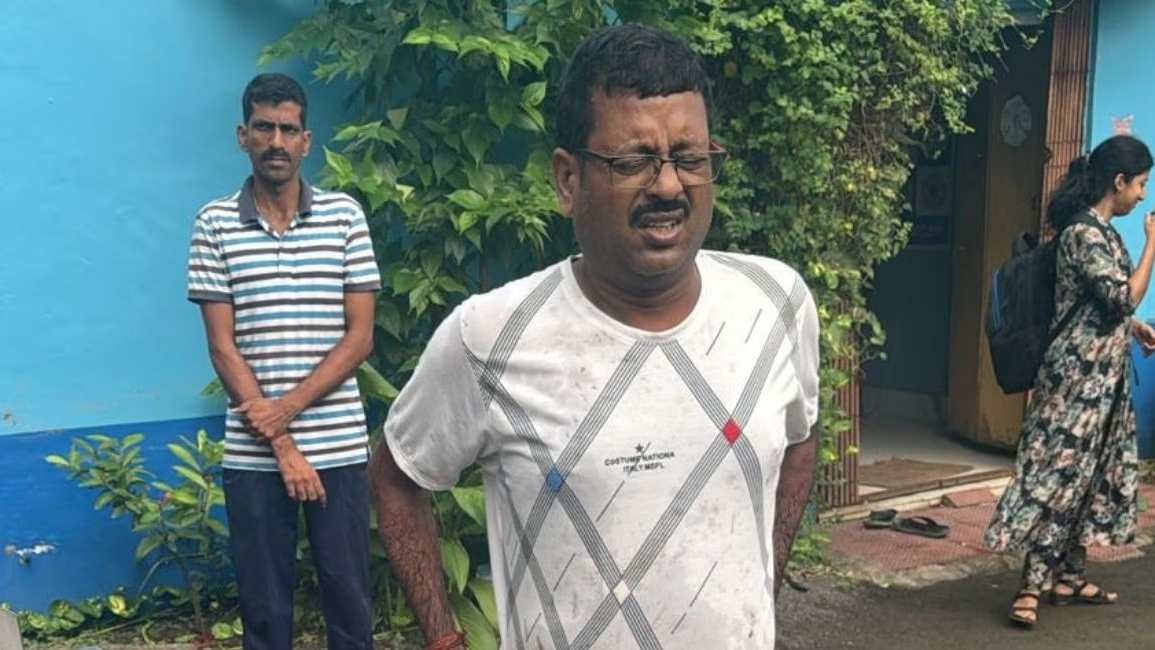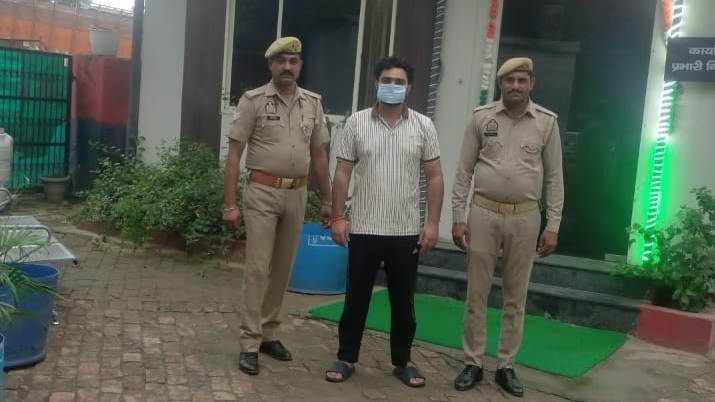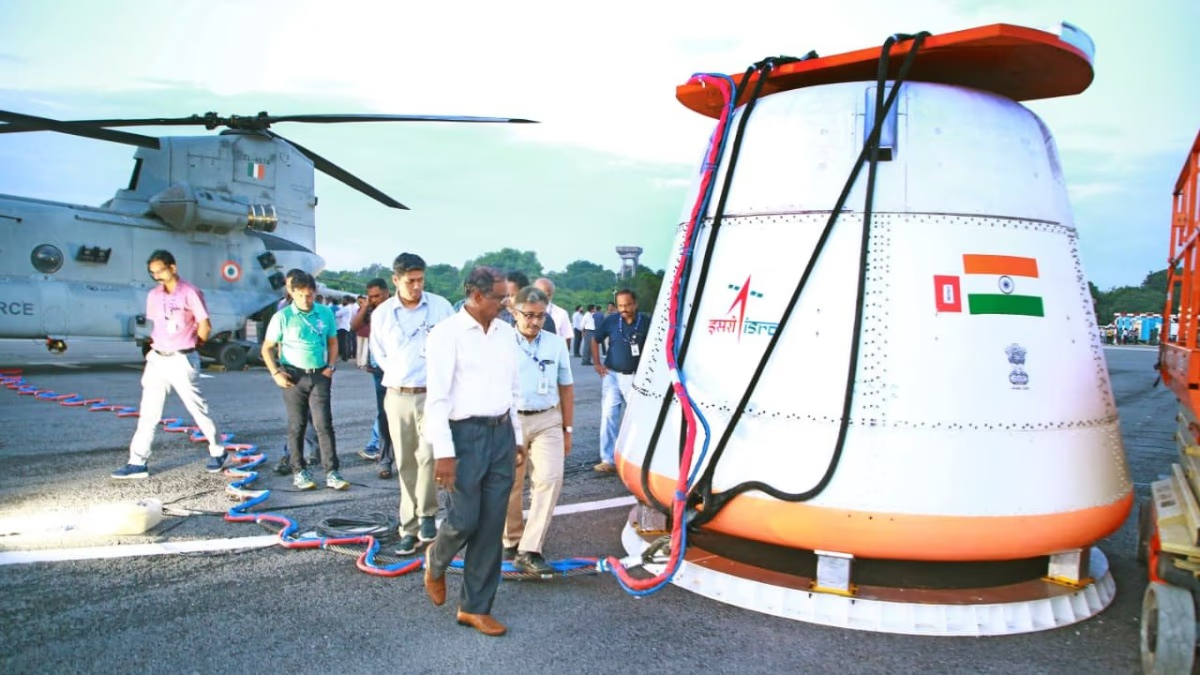Start your walk from Lal Chowk in Srinagar, and soon you'll glimpse the ghats of the Jhelum. Once adorned with Chinar trees, these banks thrived with tourists. Newlyweds captured memories under the autumn trees, children played amidst the velvet grass, and weary families sought refuge in the houseboats. This tale hails from three decades past. Today, Jhelum flows through time, echoing a bygone era.
Rukhsana (name changed), a 15-year-old girl sitting in her ancestors' damp houseboat, slowly opens up, 'My friends wear nice clothes, travel, and eat what they like. They have homes that don't tilt or sink with the breeze. I wanted out of here. Met one person, then another, and many. When I miscarried, the physical pain was less than the relief that the child wouldn't be trapped like me.'
In the room where I spoke with Rukhsana, a menu card clung to the wooden wall, pricing teas, coffees, and Maggie-biryani. A cheap painting of a sunset dulled the corner. Amidst red curtains and sheets, she appeared as faded as the old photograph on the wall. Born by the river, Rukhsana fears her life will end here too.
Once bustling with visitors, these houseboats now host guests only after long intervals. Meanwhile, Rukhsana lost herself in the struggle to meet needs, a fact she openly acknowledges.
The history of houseboats in Kashmir began in the late 19th century, according to records. During the British Raj, affluent British families vacationed in the valley. As crowds swelled, a decision prevented those without political ties from purchasing land. To escape the heat of Eastern and Central India, they built homes on the water instead.
Houseboats had kitchens, bedrooms, and guest lounges. As every Chinar sunset wove orange polka dots across the river, the owners—Kashmiris—often leased them to the British for years on end. Names like Queens Lily and New Buckingham narrate tales of that era. New or Deluxe appended later, offering an impression of upgrading after the departure of the British, houseboats remained the craftsmen Kashmiris’ pride.
The Jhelum River, threading through Srinagar, was the valley's magnetic charm. Once gone, the British and Indian adventure tourists kept coming back. But over time, Jhelum's beauty faded.
Dal Lake emerged as the new Srinagar with more cleanliness, safety, and modernity. Soon, the vibrancy of Jhelum bled into Dal.
Now, houseboats along Jhelum rest atop stagnant waters and time.
The flood of 2014 washed away dwindling hopes, shrinking the number of houseboats from a thousand to about three hundred by 2021, and now, fewer than a hundred remain. Older boats capsize in a gentle breeze, and the remaining are so cramped and bleak that tourists hesitate.
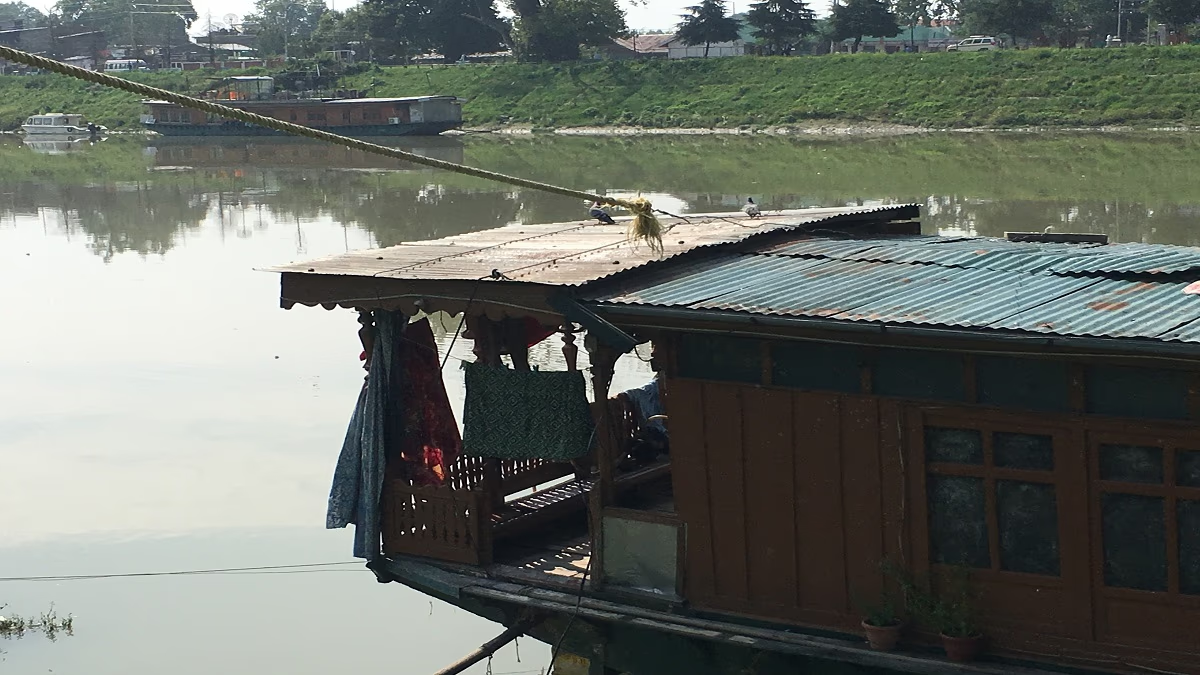
Source: aajtak
Rukhsana lives on one of these boats.
Evening approaches, and to reach the boat, a narrow bridge must be crossed, made of brittle pine planks, creaking with every step, as if ready to break. Along the shore, water lilies have given way to weeds, which the locals affectionately still call 'water roses'. Beneath them, the fetid water recalls the scent of an old bus station.
Inside, we meet Rukhsana's parents, apprehensive their daughter might wander into trouble again. Assurances are exchanged in Kashmiri-Hindi. Alone with Rukhsana now, in her shared room with an elder brother.
‘Do you study?’ she is asked.
‘No. Mama and Papa stopped me.’
‘What do you do all day?’
‘What’s there to do! I stare out the window. Listen to music on my brother’s headphones. Occasionally play games.’
‘Don’t you have your own phone?’
‘My brother’s phone broke, so he took mine.’
This girl, shrunken in body and draped in loss, reveals an ageless aura—at times appearing very young, at others much older beyond years she's spent on a wooden, sinking house.
Nearly two years back, an NGO noticed an underage girl pregnant on a houseboat. They intervened. Police arrived. Investigations unfolded many truths. The girl didn’t know the father’s identity, listing names of many she'd encountered. The pregnancy was terminated, and after counseling, she returned to the boat.
Now, interest has waned, even hers.
Sitting cross-legged, this child recalls—'Three years ago, strong winds partially submerged our houseboat. When we awakened, my legs dangled in water. Since then, Mama and Papa stepped out—either for boat repairs or land requests—but often returned empty-handed, their lives entangled around the boat.'
‘That’s when boys appeared along the Jhelum banks, some my age, others older, some resembling Dad. They hovered near our boat.'
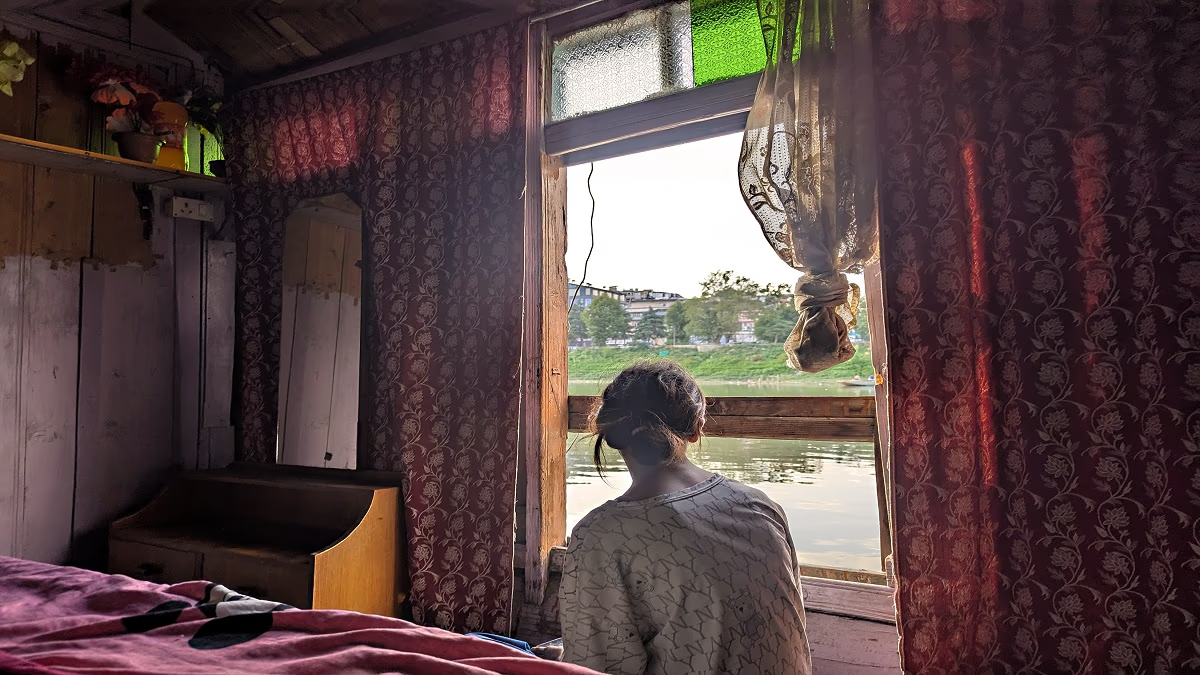
Source: aajtak
Rukhsana falls silent abruptly, as if gauging the pointlessness, her shoulders now still, tired from bearing witness to tales untold.
‘And then…?’
Resuming the rhythm, she shares, ‘I met them. At first, those my age, then older ones too. They paid.’
‘What did you do with the money?’
‘What people do with money!’ A hint of annoyance crosses the 15-year-old, ‘Bought clothes, like everyone wears. Shoes. Headphones. Explored the city. Often, I saved and gave some to Mama.’
‘So, your family was aware?’
‘I don’t know. I never told. They never asked. When months passed without a period, the questions emerged, tears and beatings from parents, silence from my brother.'
'Many new faces appeared, talking to me. Police too. Several boys were picked from the market.'
'At your age, connections are common. But why so many?’
A hint of surprise meets my understanding embrace; the girl's face, fragile and mercurial, shares, ‘All my friends wore different clothes. Ate their way. What could I do, stranded in this wreck all day!’
‘After the miscarriage, I've remained here. Mama and Papa won't let me go.’
'What about your brother?'
‘He doesn’t hit, but scolds. He's at the gym now. I asked to go, but he refused. They fear my old habits might return.'
Nonchalantly, Rukhsana unravels the threads, while the next day brings a chance encounter with her father, pleading for money to repair the boat or marry off his daughter.
‘But Rukhsana is just fifteen, why marry her now?’‘Keeping her here, can we feed her! She's at least assured a meal there. You don't understand…’ Muttering, I move on before delving too deep.
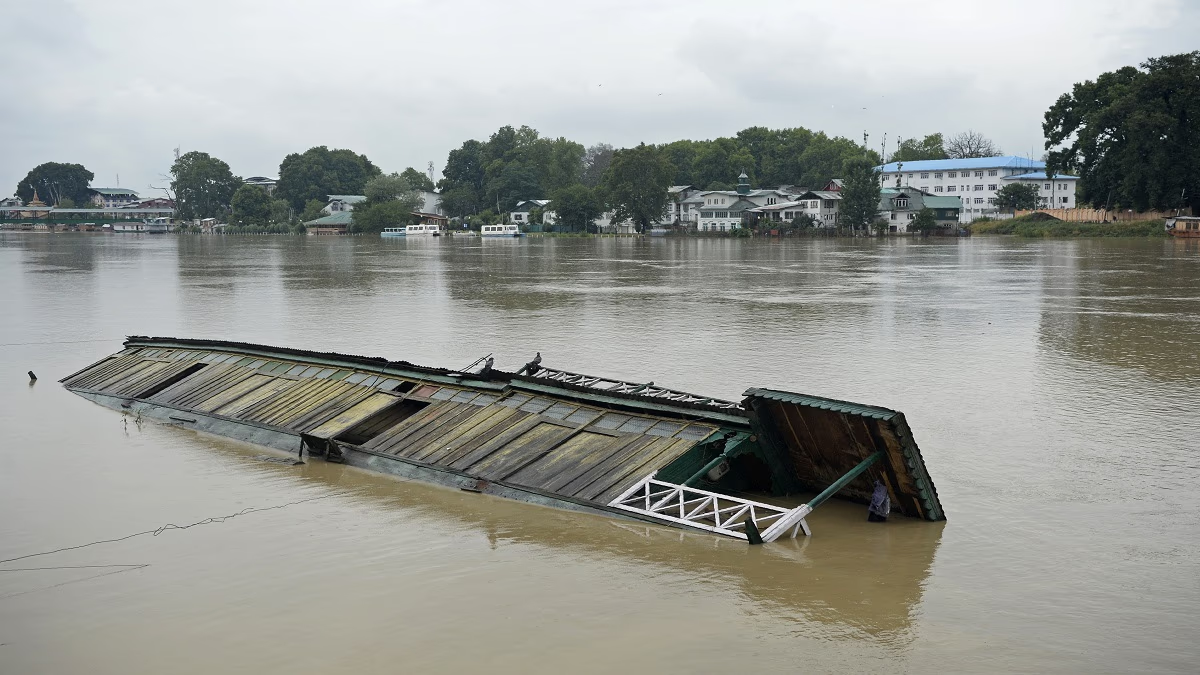
Source: aajtak
In Srinagar, floating homes pass from generation to generation. A community celebrates togetherness in weddings and mourns together in grief, often facing exclusion.
Those dwelling on solid ground view the ‘water dwellers’ as lacking social 'standing'. This perception extends to those along the Jhelum, Dal, and boatmen too.
The accompanying driver confides, ‘They lack manners in conversation. Their wits submerged in water, devoid of standards, why would we associate with them?’
People residing by water, known as ‘Hanji’, face historical ignorance, but it's local chauffeurs and professionals who hushly perpetuate the term, now wielded to belittle.
Many families strive to move onto land—from water to earth as daunting as Earth to Mars. No water, no flora, nor air. Just time ticking away.
Traipsing along the Jhelum, we spotted homes, part on land, part afloat. Harried by weeds and sludge, reaching them was challenging. We ventured downtown, guessing the way easier.
This is where we encounter Ghulam Qadir Gasi.
A fierce 2023 storm capsized Gasi’s boat, thrusting him onto the street! After the disaster, two tents provided brief refuge, lined along the roadside for weeks. Peering passersby showed varied reactions—some curious, some displeased, and others intrigued by the novelty.
Since then, Gasi has found a corner in a relative's boat.
The water home offers four rooms. Two reserved for guests, rare and infrequent, with over ten family members occupying the remaining, while a frail bridge judders uneasily back. A helping hand comes from Gasi’s daughter, herself a parent. With her guidance, humor, and solace, she remarks, ‘I keep an eye on my children all day, lest they slip through the window into the water, or wander outdoors! Without practice, you’d be scared, too.’
Gasi queries, ‘Will this video be on TV?’
I shrug in the manner learned from Rukhsana. Taking it as affirmation, he gestures, agreeing jovially, ‘I'll change into something tidy. Meanwhile, talk with these kids, but please, no pictures or video. It’ll upset the household.’
His kids—daughter, granddaughter, maybe another sister, who knows—a little girl offers me her boiled egg repeatedly. I politely decline with a smile, as the mother intervenes, scolding softly.
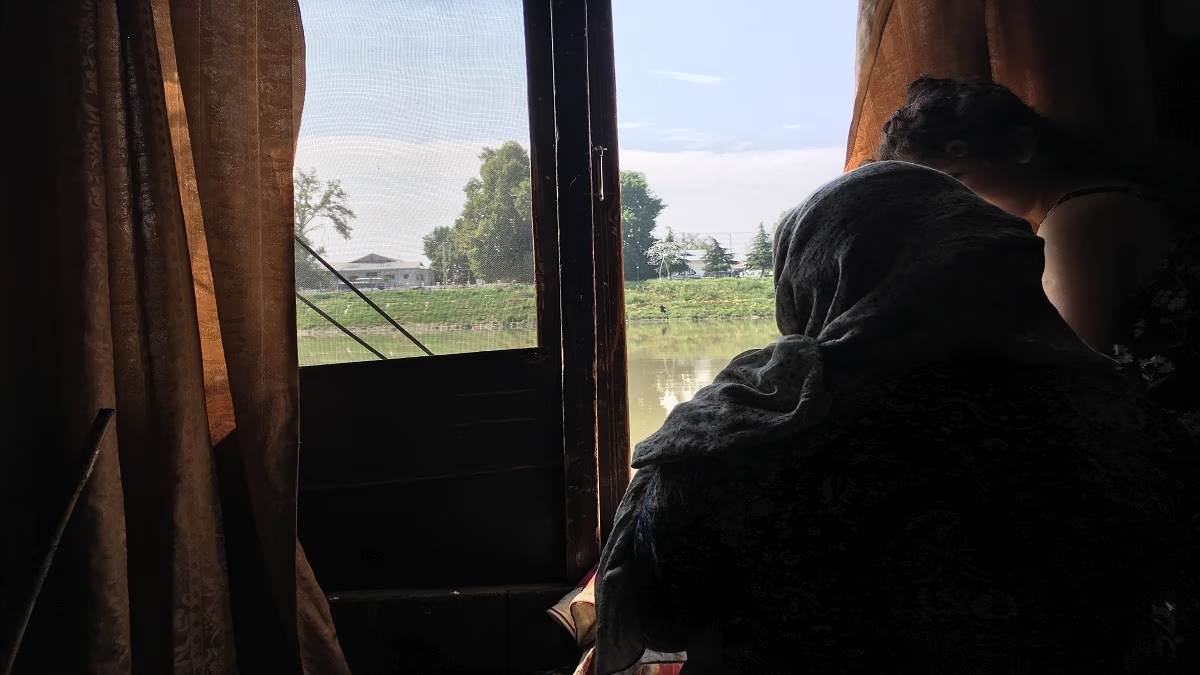
Source: aajtak
‘I was born here. So were my children. Perhaps their children will follow.’ Occasionally pausing her daughter, she candidly explains.
‘Why not marry into a family with a house on land?’
‘Our marriages stay within boat-dwelling families. We may move from Jhelum to Dal but will remain here.’ Shazia’s voice lingers in ambivalence.
Shazia, commuting from boat to boat, understands the world is vaster, richer, where houses don’t sway in the breeze, nor carry scents of damp wood but the aroma of exquisite perfumes...or where children play free of drowning fears in a courtyard.
Wrapping her shawl with grace, Shazia adds, ‘For tourists, a houseboat is distinct. They come, linger a day or two, explore, then leave. We persist here. During snowfall, we clear the roof repeatedly to prevent sinkage under the weight. In rain, we tread cautiously to avoid flooding. Summer poses dangers too—a snake clinging here, a critter there.’
‘Do tourists visit your boat?’
‘Once every few months, maybe one. Normally young travelers, lacking funds for Dal overnights. Rates once soared to 1000, now we agree to 200-300.’
‘Why not sell the boat, buy a house?’ I propose.
Akin to witnessing naivety, Shazia laughs heartily, her jingling laugh chiming with sophistication that could merge amidst Delhi’s Connaught Place. Shazia apologizes, briefly, ‘Selling this won’t suffice. At most, a few lakhs. House prices exceed 50. Selling ends relationships too.’
‘Time is meant to march on, but here it’s on pause. My mother warned us to avoid falling from windows into water. We caution our children. An open yard would banish drowning dread during play.’
Unable to display her face, I capture Shazia by the window. Through its barsless frame, the cool wind is replaced with lurking dread.
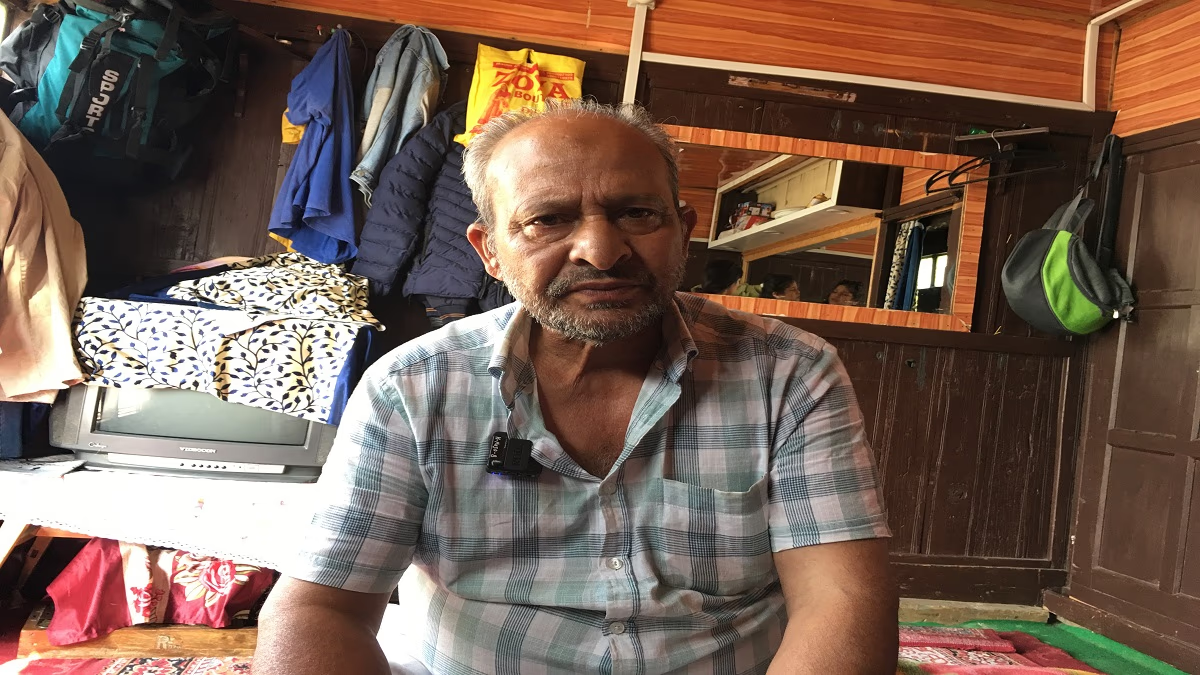
Source: aajtak
Gasi waits patiently.
Papers burgeoning on his lap, he shows them one by one, noting, ‘I’ve circled every government office. Written every letter. It’s been three years since the boat sank. The government gave us two tents then. But how long can we live roadside! Now at relatives’ house, until when here!’
‘Will you show this on TV?’ A hopeful inquiry revisits, laden with yearning.
While his daughter aids across, parting calmly, she confesses, ‘Papa's boat isn't all that's sunk—it’s our lives in Jhelum, drowned and lost.’
In Kashmir, the houseboat community, living and earning by lakes and rivers, remains on the fringes of mainstream society, distanced from average Kashmiris, with few intermarriages or large communal ties. The reason and efforts for improvement led to a social activist, somewhat of the same ilk.
Vehement on anonymity, they acknowledge Kashmiri mass views them as second-class citizens.
Detailing reasons, they share, ‘Houseboaters lived without walls. Their quarrels played open, spectator entertainment instead of intervention, making them seem inferior. Distancing intensified over time, and now boat operators refuse to inhabit theirs. Governments promise rehabilitation, but nothing firm materializes.’
Despite thorough disclosures, they persistently request anonymity, warning, ‘People already view us as lesser. This would worsen.’
